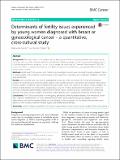Files in this item
Determinants of fertility issues experienced by young women diagnosed with breast or gynaecological cancer - a quantitative, cross-cultural study
Item metadata
| dc.contributor.author | Sobota, Aleksandra | |
| dc.contributor.author | Ozakinci, Gozde | |
| dc.date.accessioned | 2018-09-07T09:30:06Z | |
| dc.date.available | 2018-09-07T09:30:06Z | |
| dc.date.issued | 2018-09-06 | |
| dc.identifier | 255427233 | |
| dc.identifier | 03073f7f-d4fe-4e3e-bfa8-aba1a575e0fe | |
| dc.identifier | 85052925688 | |
| dc.identifier | 000443892800002 | |
| dc.identifier.citation | Sobota , A & Ozakinci , G 2018 , ' Determinants of fertility issues experienced by young women diagnosed with breast or gynaecological cancer - a quantitative, cross-cultural study ' , BMC Cancer , vol. 18 , no. 874 . https://doi.org/10.1186/s12885-018-4766-y | en |
| dc.identifier.issn | 1471-2407 | |
| dc.identifier.other | ORCID: /0000-0001-5869-3274/work/48131982 | |
| dc.identifier.uri | https://hdl.handle.net/10023/15987 | |
| dc.description | This study was part of a PhD project funded by the Danuta Rischardson Medical Scholarship. | en |
| dc.description.abstract | Background. Although there is a recognition of the importance of fertility to young women with cancer, we do not know who is at risk of distress related to fertility issues following diagnosis. We investigated the determinants of fertility-related distress adopting a cross-cultural perspective and using the Common Sense Model (CSM). We chose the CSM as a theoretical framework as it allows to explore how individuals conceptualise illness within the socio-cultural context. Methods. British and Polish women with breast or gynaecological cancer were recruited through outpatient clinics or online outlets and completed a questionnaire. Linear regression, mediation and moderated mediation methods were performed. Results. One hundred sixty-four women participated (mean age 34.55 (SD = 6.66); 78.7% had gynaecological cancer). The determinants of fertility-related distress were: country of origin, recruitment site, negative affect, desire to have children, treatment regret, and total illness perception score. The impact of the desire to have children on fertility-related distress was mediated by psychological value of children, perceived consequences of cancer on one’s life, emotional representation, and treatment-related regret. Country of origin moderated the relationship between the desire to have children and fertility-related distress when mediated by treatment-related regret. Conclusions. The CSM proved useful in investigating predictors of fertility-related distress, with emotional, rather than cognitive representation of illness determining its levels. Socio-cultural background played a role in determining one’s fertility-related distress and contributed to the explanation of the relationship between one’s desire to have children, treatment-related regret, and fertility-related distress. | |
| dc.format.extent | 751274 | |
| dc.language.iso | eng | |
| dc.relation.ispartof | BMC Cancer | en |
| dc.subject | Cancer | en |
| dc.subject | Fertility | en |
| dc.subject | Oncofertility | en |
| dc.subject | AYA cancer | en |
| dc.subject | Gynaecological cancer | en |
| dc.subject | Breast cancer | en |
| dc.subject | Quality of life | en |
| dc.subject | Cross-cultural | en |
| dc.subject | R Medicine (General) | en |
| dc.subject | E-DAS | en |
| dc.subject | SDG 3 - Good Health and Well-being | en |
| dc.subject.lcc | R1 | en |
| dc.title | Determinants of fertility issues experienced by young women diagnosed with breast or gynaecological cancer - a quantitative, cross-cultural study | en |
| dc.type | Journal article | en |
| dc.contributor.institution | University of St Andrews. Population and Behavioural Science Division | en |
| dc.contributor.institution | University of St Andrews. Health Psychology | en |
| dc.contributor.institution | University of St Andrews. St Andrews Sustainability Institute | en |
| dc.contributor.institution | University of St Andrews. School of Medicine | en |
| dc.identifier.doi | 10.1186/s12885-018-4766-y | |
| dc.description.status | Peer reviewed | en |
This item appears in the following Collection(s)
Items in the St Andrews Research Repository are protected by copyright, with all rights reserved, unless otherwise indicated.

